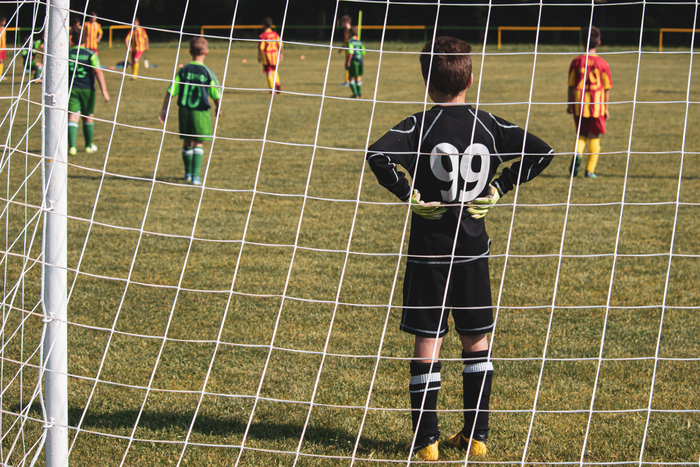Team sports linked to fewer mental health difficulties for kids
Research on U.S. children and adolescents found that participation in a team sport is associated with fewer mental health difficulties.

[July 6, 2022: Hanna Abdallah, PLOS]
Young athletes on a soccer field. (CREDIT: Creative Commons)
The World Health Organization (WHO) has cited poor mental health as one of the leading predictors of disability and economic burden. Among children and adolescents, mental health difficulties are prevalent across the world. One factor that may protect against the development of mental health difficulties is participation in organized youth sport. Paradoxically, some research has linked youth sport participation with adverse outcomes such as anxiety and burnout.
A large-scale study of U.S. children and adolescents has found that participation in a team sport is associated with fewer mental health difficulties, but that kids who are exclusively involved in an individual sport—such as tennis or wrestling—may face greater mental health difficulties than kids who do no sports at all. Matt Hoffmann of California State University, U.S.A., and colleagues present these findings in the open-access journal PLOS ONE.
Researchers adopted the view that ‘organized youth sport’ encompasses both child and adolescent participation in organized physical activity, is generally directed by adult or youth leaders, involves rules and formal practice, and is competitive in nature. Because rates of organized youth sport participation are relatively high in some countries but inadequate in others, continued efforts to promote sport participation and determine which types of organized sport best support child and adolescent mental health are warranted.
The purpose of the study was to extend the literature by exploring the link between participation in organized sport and a comprehensive catalogue of mental health difficulties among US children and adolescents.
Related Stories:
Previous research has consistently suggested that youth participation in organized sports might help protect against mental health difficulties. However, some studies have linked youth sports participation to worse mental health, so more detailed research is needed to determine which approaches to sports might be most beneficial.
To shed new light, Hoffmann and colleagues analyzed data on the sports habits and mental health of 11,235 kids aged 9 to 13. Parents and guardians reported on several aspects of the children’s mental health by filling out a form known as the Child Behavior Checklist.
The researchers looked for any associations between the mental health data and the kids’ sports habits, while also accounting for other factors that might impact mental health, such as household income and overall physical activity.
In line with the researchers’ expectations, the analysis showed that kids involved in team sports were less likely to have signs of anxiety, depression, withdrawal, social problems, and attention problems.
The researchers also expected individual sports to be associated with fewer mental health difficulties, even if to a lesser extent than for team sports. However, they instead found that children who exclusively played individual sports tended to have greater mental health difficulties than those who did not play sports at all. Nonetheless, for female kids, participation in both team and individual sports was associated with a lower likelihood of rule-breaking behavior than non-sports participation.
Overall, these findings add to a growing body of evidence that playing team sports is positively associated with mental health for children and adolescents. The authors suggest that further research could help clarify the link they observed between individual sports and worse mental health difficulties, and longitudinal observations are needed to investigate any causal relationships between sport participation and mental health.
The authors add: “Children and adolescents who played exclusively team sports, like basketball or soccer, had fewer mental health difficulties than those who did not participate in any organized sports. However, to our surprise, youth who participated in only individual sports, such as gymnastics or tennis, had more mental health difficulties compared to those who did not participate in organized sports.”
Note: Materials provided above by PLOS. Content may be edited for style and length.
Like these kind of feel good stories? Get the Brighter Side of News' newsletter.
Joshua Shavit
Science & Technology Writer | AI and Robotics Reporter
Joshua Shavit is a Los Angeles-based science and technology writer with a passion for exploring the breakthroughs shaping the future. As a contributor to The Brighter Side of News, he focuses on positive and transformative advancements in AI, technology, physics, engineering, robotics and space science. Joshua is currently working towards a Bachelor of Science in Business Administration at the University of California, Berkeley. He combines his academic background with a talent for storytelling, making complex scientific discoveries engaging and accessible. His work highlights the innovators behind the ideas, bringing readers closer to the people driving progress.



